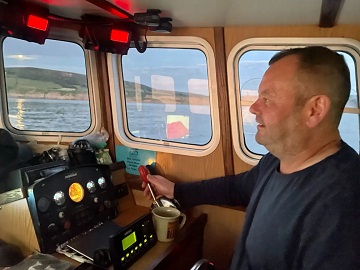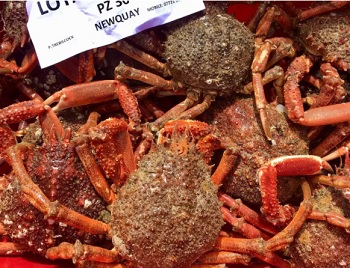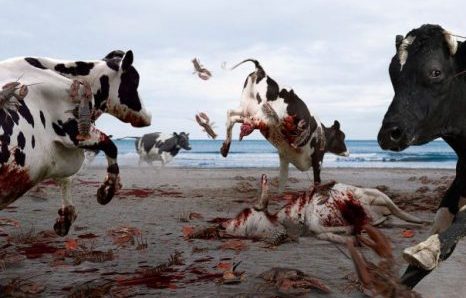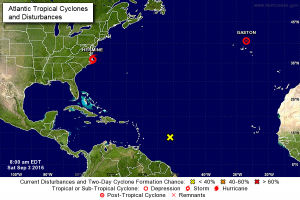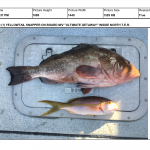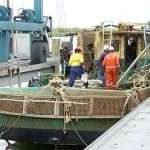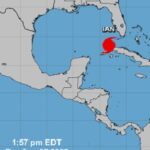Tag Archives: lobsters

From Lobsters To Electricity, Offshore Wind Making Everything More Expensive
National Lobster Day is a good time to look at what Bidenomics is going to do to lobsters and the $400 million lobster industry. And it isn’t good. It isn’t good for electric users’ budgets either. Biden’s 30 GWs of offshore wind is catering to the left’s rush to “end fossil fuels” (which provide 80% of our energy) is wrongheaded. It is part of a costly, unnecessary, not well-thought-out transition to part-time, weather dependent, Middle Ages technology. Only a fool ends their primary energy or food source before it is fully replaced. Offshore wind towers harm lobsters in several ways. 30,000 MW of offshore wind will take 3,000 to 4,000 800 ft towers placed at least a mile apart in all directions, 2 to 5 miles is better. Those towers take the energy out of the wind, altering weather patterns. by Frank Lasee >>click to read<< 10:50
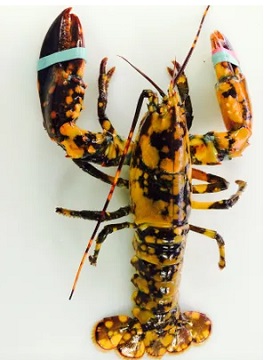
What’s behind the surge of blue, orange and calico lobsters in the Gulf of Maine?
If you have been to the Oceanarium at Hampton Beach, you know that we usually have some odd-looking lobsters. We currently have an orange, a blue, a calico, and a normal-colored lobster in our tanks. The question is always: How rare are these animals? The answer has gotten more and more murky as the years pass. The color of lobsters can be due to several things. Diet can cause them to be less vivid or more yellow from eating certain seaweeds. Shell disease can cause them to be spotted and appear to be calico. The color can also be caused by a genetic mutation, which affects the proteins in their exoskeleton. photos, >click to read< 10:53
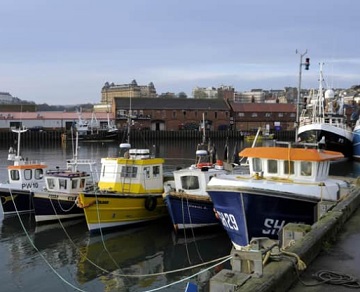
‘The job’s f****d’ – Fishers slam local MP for comments
The North East Fishing Collective (NEFC), which represents fishers from Hartlepool to Whitby, was established to support fishers along that stretch of coast after unexplained mass deaths of shellfish in the area in several events from September 2021 onwards left them without catches. Hartlepool MP, Jill Mortimer, last week shared a photo of her in a meeting with Environment Minister Mark Spencer in Parliament where she described how “prawners have experienced a temporary but significant reduction in their catches due to prawns burrowing into sands.” “The prawns and catches returned,” she wrote, however the NEFC has disputed this in no uncertain terms. >click to read< 14:57
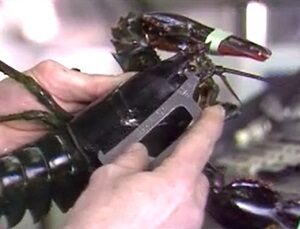
Legal sizes for lobsters trapped off New England could change to protect population
The regulatory Atlantic States Marine Fisheries Commission is considering changing the standards by a fraction of an inch in some of the fishing grounds. The commission said it’s considering the changes because of a worrisome lack of baby lobsters growing off New England. The commission is soliciting public comment on the proposal and plans to hold public hearings about it in March, Starks said. The changes would affect lobster fishers from Maine to the waters off southern New England, and the hearings will be held in those places, Starks said. Changes could be implemented by fall 2024 if they are approved,,, >click to read< 09:09

Are we really going to let them kill our ocean and our fishing way of life?
Generations of fishermen are no longer fishing because of the restrictions and unfair quota from faulty science. Like I said in earlier posts, we went from 400 active boats down to 17 barely active boats. Meanwhile conservation groups will tell you that we are wiping the ocean out from overfishing. That is so wrong on so many levels, it isn’t even funny. Hard to believe New England was considered to be sustainable for haddock and lobsters. Then fishing efforts went down and now we are no longer sustainable. The only thing that’s changed is windmills are on their way to the Gulf of Maine and the management at NOAA and NMFS are allowing it to happen. Why would they not talk to the people who have committed their lives to the job of harvesting our ocean?! Well, I can’t speak for everyone, but I have a few hypotheses. By Jerry Leeman. >click to read< 16:38
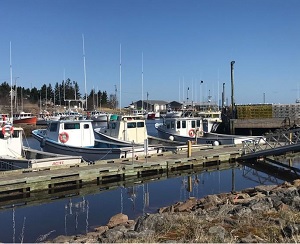
The fisherman’s helper By Vincent Joyce
Since man first went out in his own fishing boat, he has had a fisherman’s helper. When I first went lobster fishing, I didn’t know a thing about it. I had to learn everything from scratch. The only thing that a person had to have is the love of the sea. A person had to learn all about fishing from his boss as you went about your daily work. You had to do what you were supposed to do in all areas of peaceful and dangerous times in a boat, weather-wise. A person learned very, very fast. For example, always watch those traps and rope when you were pushing them off the boat and back into the water. Most times, a fisherman would hire his helper through the winter months or in the early spring. Once the fisherman had a good or great helper hired, he would keep him for as long as he wanted to stay or until he bought his own fishing gear. >click to read< By Vincent Joyce, a former long-time fisherman’s helper 17:18

Lobster industry and lawmakers await court decision to determine legality of new restrictions
Maine and Massachusetts harvest more than 90% of the American lobsters sold in the U.S. and most lobstermen and New England lawmakers want to keep it that way. Over the past year, a dispute over new federal regulations on Maine’s lobster industry, intended to protect the endangered North Atlantic Right Whale,,, Mike Sargent became the captain of his own boat at 15. The 29-year-old is worried, however, that if regulations adopted by the National Oceanic and Atmospheric Administration in 2021 are ruled lawful by the U.S. District Court of the District of Columbia, that more expensive and stricter regulations could follow. “There’s talks of ropeless fishing and so on, and those are astronomically expensive and quite frankly could bankrupt this industry at the stroke of a pen,” Sargent said. Massachusetts lobsterman Dave Casoni said that it would cost lobstermen between $500,000-$600,000 to make the switch to ropeless traps, and if passed Casoni believes it could bankrupt the industry. Video, >click to read< 09:16
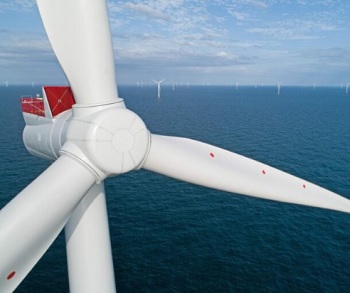
Fishermen seek greater understanding of wind farm impacts
Projects already in the pipeline could wreak havoc with key spawning and nursery grounds for important fish stocks, they warned today. According to Shetland Fishermen’s Association (SFA), there are major overlaps between proposed areas of offshore wind farm development and sensitive ecosystems for young fish. Several wind farm areas will impact the spawning and nursery grounds of Scotland’s most valuable pelagic fish stocks, such as mackerel, herring and blue whiting, the industry body added. SFA also pointed to research showing a negative impact on shellfish species from offshore turbines and associated cabling. >click to read< 19:11
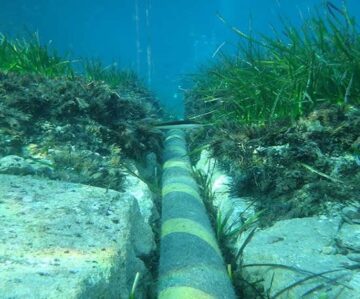
Lobsters Develop Malformations in The Presence of Submarine Power Cables
A European study recently revealed an example proving that submarine power cables can have undesirable consequences on marine animal species. The work focuses on lobster, some specimens of which may indeed present malformations. With the help of other European researchers, a laboratory at the St Abbs marine station (United Kingdom) carried out a very telling experiment. The scientists exposed no less than 4,000 lobster eggs to a level of electromagnetic field similar to those usually present near undersea cables. At the same time, they observed the development of another group of unexposed eggs. According to the results, lobsters exposed to the waves are three times more likely to suffer from malformations. >click to read< 12:26
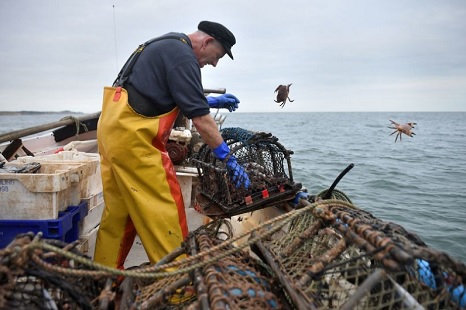
The Cromer crab is a Norfolk staple – but does it have feelings?
According to a report by the London School of Economics, there is strong scientific evidence to suggest crabs do feel and that they should be treated more humanely. The government’s Animal Welfare (Sentience) Bill, currently passing through parliament, is set to recognise crabs, lobsters and octopuses as ‘sentient beings’. Fisherman Mr Lee said the report’s suggestion that lobsters should not be boiled was “a total bloody nonsense”. Sue Riseborough, who served as Wells-next-the-Sea’s first and last gillying warden from 2016 to 2019, the recognition of crabs’ sentience is “brilliant” and “can’t be ignored”. >click to read< 08:55
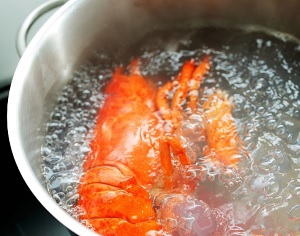
Netherlands to ban live boiling of lobsters, crabs
Minister Carola Schouten of Agriculture wants to ban the live boiling of lobsters and crabs. She will also look into what can be done in the Netherlands to ensure that the animals are not cooked alive.,, This follows a recent study commissioned by the British government that found strong scientific evidence that crabs, lobsters, and octopuses can suffer and experience pain. Britain, therefore, added them to the animal protection legislation. Animal welfare organizations want the Netherlands to do the same. >click to read< 11:38
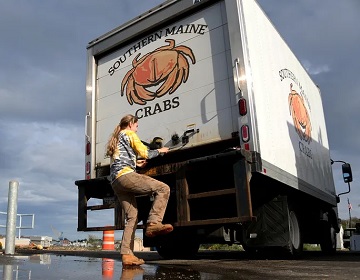
Kittery woman, owner of Southern Maine Crabs, creates seafood niche
Twenty-three-year-old Jillian Robillard is the owner and founder of Southern Maine Crabs, a processing facility based out of Kittery that specializes in Jonah crabs and lobsters. Growing up on the docks, Robillard noticed lobster fishermen were catching crabs in their lobster traps and throwing them back or crushing them up for bait. When Robillard noticed the price of lobsters increased and the crab prices remained the same, she saw an opportunity in the market. photos, >click to read< 13:27

Going Full Crackpot! Sale of live crabs, lobsters and fur banned in Amsterdam markets
Fur and live crabs and lobsters will no longer be allowed to be sold at markets in the Dutch capital from 2022. Amsterdam city council has decided to ban the sale on animal rights grounds, a pledge that was part of the current city coalition agreement. ‘Amsterdam has 34 markets, the most in the country,’ said economic affairs chief Victor Everhardt, a D66 liberal democrat, in a press release. ‘In the interests of animal welfare, there will be a ban on the sale of fur and live crabs and lobsters, and it will be actively enforced.’ The city is not the first to take more action in the interest of animal rights. >click to read< 08:33
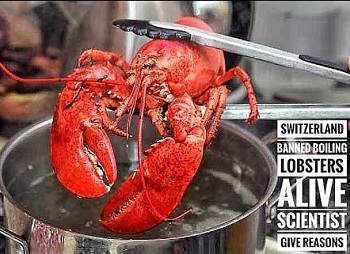
Speaking of the nutters! U.K. weighing ban on boiling lobsters alive
Under new amendments to animal welfare bill, crabs, lobsters, octopi, squid and other invertebrates, are set to be recognized as sentient beings that are capable of feeling pain. A simple google search will tell savvy home cooks looking to try their hand at cooking lobster to simply plunge the live creatures, headfirst, straight into a pot of (salted) boiling water. A piece of animal welfare legislation is currently winding its way through the U.K. parliament. “Lobsters struggle violently for approximately two minutes after being placed in boiling water,,, “scalding” animals to death is “unnecessarily cruel”, a belief that has been echoed by other animal welfare advocates and organizations, like the U.K. based Crustacean Compassion. Legislation banning boiling of lobsters alive has already been passed in a handful of countries, including New Zealand, Switzerland and Austria. >click to read< 20:34
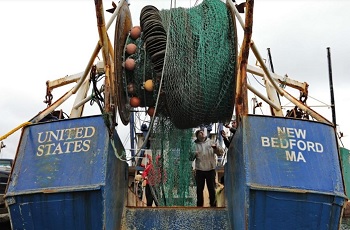
‘Too early to tell’ impact of Coronavirus on New Bedford fishing industry
Since the fishing industry was deemed part of the food supply chain, it is allowed to keep operating as an essential service under Gov. Charlie Baker’s stay-at-home advisory. “Immediate impacts have been minimal,” scalloper Eric Hansen said Thursday, “The market is a little bit depressed but nothing crazy. My bigger concern is the future, what’s going to happen in the next couple of months.” What worries Hansen about the future is the April 1 start of the next scalloping season, which will bring back scallopers that hadn’t been fishing because they used up their 2019 allocations. >click to read< 09:16
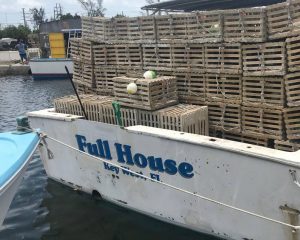
Where did all the lobsters and stone crabs go? How the fishing industry is bouncing back
The red tide algae bloom plaguing Southwest Florida hasn’t hit the Florida Keys. And Hurricane Irma happened more than a year ago. But they’re both affecting the island chain’s commercial fishing industry. That’s a crucial impact because the industry is the second-largest stand-alone economic generator in the Keys next to tourism. Fishing is estimated by the Florida Keys Commercial Fishing Association to bring in about $900 million a year to the Monroe County economy. That includes transactions such as fuel sales, dockage fees, and boat and engine repairs. >click to read<18:13
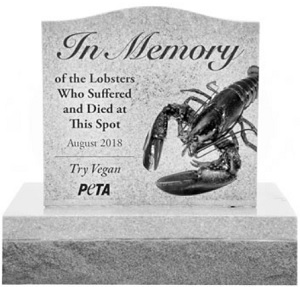
PETA seeks to honor their brother and sister lobsters, with a stone
People for the Ethical Treatment of Animals sent a request to the Maine Department of Transportation to place a five-foot roadside memorial honoring the lobsters. A truck carrying 70 cases of lobsters rolled over and crashed on a highway in Brunswick, strewing cases of the creatures. “Countless sensitive crustaceans experienced an agonizing death when (a) truck rolled over and their bodies came crashing down onto the highway,” PETA Executive Vice President Tracy Reiman said in a statement. >click to read<20:10
New England, Mid-Atlantic States Lead Nation in Volume and Value of Several Key Fisheries
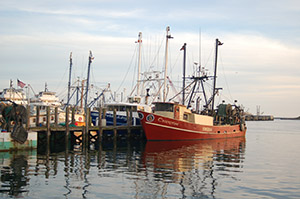 NOAA Fisheries has released the Fisheries of the U. S. 2016 report, and once again New Bedford, Mass. was the leading U.S. port by value and American lobsters were the nation’s most valuable landed species. Alaska led all states in the value and volume of commercial landings, with 5.6 billion pounds valued at $1.6 billion. Maine and Massachusetts ranked second and third in the value of landings at $633.6 million and $552.1 million, respectively. American lobsters were the nation’s top-valued species landed, with crabs second and scallops third. Alaska pollock ranked first in volume of landings, followed by menhaden and Pacific cod. click here to read the story 17:39
NOAA Fisheries has released the Fisheries of the U. S. 2016 report, and once again New Bedford, Mass. was the leading U.S. port by value and American lobsters were the nation’s most valuable landed species. Alaska led all states in the value and volume of commercial landings, with 5.6 billion pounds valued at $1.6 billion. Maine and Massachusetts ranked second and third in the value of landings at $633.6 million and $552.1 million, respectively. American lobsters were the nation’s top-valued species landed, with crabs second and scallops third. Alaska pollock ranked first in volume of landings, followed by menhaden and Pacific cod. click here to read the story 17:39
After Irma: Storms leave lobsters, stone crab seasons underwater
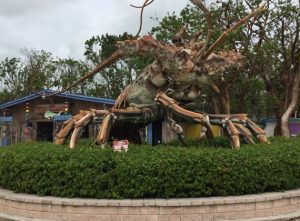 The Florida Keys have re-opened, but Capt. Billy Niles and his fellow lobster fishermen have to find their traps before they are really back in business. “We’re locating them, but it takes a while,” said Niles, a veteran of the Keys lobster trade for the past seven decades. “Some storms lose more than others.” Irma lost plenty of them. Or better said, the Keys lost plenty in Irma. In the lobster sector, said to be the Keys second most-important industry, the damage is underwater. click here to read the story 09:12
The Florida Keys have re-opened, but Capt. Billy Niles and his fellow lobster fishermen have to find their traps before they are really back in business. “We’re locating them, but it takes a while,” said Niles, a veteran of the Keys lobster trade for the past seven decades. “Some storms lose more than others.” Irma lost plenty of them. Or better said, the Keys lost plenty in Irma. In the lobster sector, said to be the Keys second most-important industry, the damage is underwater. click here to read the story 09:12
Lobsters seized from offshore trawler donated to homeless veterans by Massachusetts Environmental Police
 Massachusetts Environmental Police donated lobsters seized from an offshore trawler in New Bedford to veterans after officials determined the lobsters could not be returned to the water. Environmental police officers conducted an inspection of an offshore trawler in New Bedford on Sunday and found the vessel caught more than 500 lobsters. Commercial trawlers are limited to 100 lobsters daily and cannot exceed more than 500 lobsters if caught outside of state waters, authorities said. “After counting the lobsters being offered for sale, it was determined the vessel was over the 500 count limit,” according to the Environmental Police. “Officers seized the lobsters and cited the vessel for being over the limit.” read the rest here 13:21
Massachusetts Environmental Police donated lobsters seized from an offshore trawler in New Bedford to veterans after officials determined the lobsters could not be returned to the water. Environmental police officers conducted an inspection of an offshore trawler in New Bedford on Sunday and found the vessel caught more than 500 lobsters. Commercial trawlers are limited to 100 lobsters daily and cannot exceed more than 500 lobsters if caught outside of state waters, authorities said. “After counting the lobsters being offered for sale, it was determined the vessel was over the 500 count limit,” according to the Environmental Police. “Officers seized the lobsters and cited the vessel for being over the limit.” read the rest here 13:21

Proposals Aim To Restore Lobsters To Long Island Sound
A new interstate plan is being considered to try and halt the dramatic decline in lobster populations in Long Island Sound and southern New England waters, but experts warn none of these proposals may work in the face of global warming. The draft plan by the Atlantic States Marine Fisheries Commission includes possible changes in the size of lobsters allowed to be kept, reductions in the number of lobster traps allowed in the region, and additional lobster season closures. But a former president of the Connecticut Commercial Lobstermen’s Association, Nick Crismale of Branford, doubts the once-thriving lobster population in the Sound will ever recover. Increasingly warm waters in the Sound may have also resulted in an increase in fish species that prey on lobsters, like black sea bass, making any recovery more difficult, experts say. A number of Connecticut lobstermen believe the population plunge was triggered by the use of certain pesticides to kill mosquitoes carrying the West Nile Virus. Read the story here 15:21
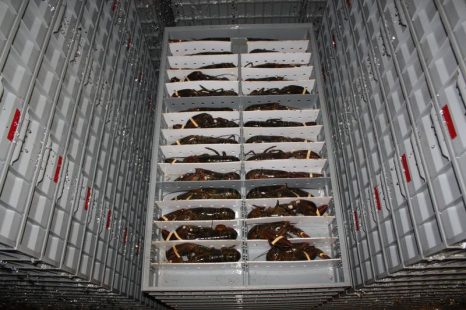
The online market in China is huge! The Province wants Nova Scotia’s lobster industry to get its share
Lobsters from Nova Scotia are already selling on China’s Alibaba massive e-commerce website but now the province is stepping in with a pilot project to ensure only the best of the best are sold on Alibaba’s retail sister site Tmall. It’s all part of plan to boost Nova Scotia’s lobster exports to China , valued at $113 million in 2015. Tmall.com says it is the biggest business-to-consumer retail platform in Asia. It already sells Cuban lobsters and parent Alibaba.com has more than 2,000 listings for lobster, including 76 offers to sell live Nova Scotia lobsters. Peng Song’s Hiyou Trading Company lists lobster for US$6 to US$10 — with a minimum order on Alibaba. And Charlie Jin’s World Link Food Distributors is asking between US$6 and US$16 with a minimum order of 20 cases. The province wants Nova Scotia’s lobster industry to get its share of what’s becoming a massive, online live lobster market. Continue reading the article here 09:24
Exporting crustaceans a ‘crazy juggling game’ – Maine Coast Co. delivers lobsters around the world
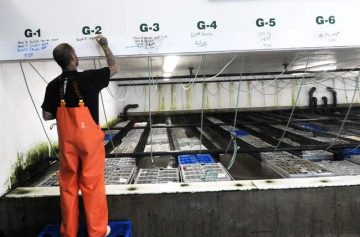 Every day is a “crazy juggling game” for Tom Adams, owner of the wildly successful lobster wholesaler Maine Coast Company. His product is live and perishable. His customers are in Seoul, South Korea, Madrid, Spain, or San Francisco. He has to worry about Homeland Security regulations, endless paperwork for China exports, planes that don’t take off on time. “There’s a lot of risk when your product is controlled by Mother Nature,” said Adams. “We have to get it where it’s going in 48 to 60 hours. Any delay means it doesn’t get there alive. My strong point, I think, is that I have the gut instinct to most of the time play the market correctly. It’s no different than oil futures or some other commodity. It’s just that I’m dealing in lobsters.” Read the story here 11:44
Every day is a “crazy juggling game” for Tom Adams, owner of the wildly successful lobster wholesaler Maine Coast Company. His product is live and perishable. His customers are in Seoul, South Korea, Madrid, Spain, or San Francisco. He has to worry about Homeland Security regulations, endless paperwork for China exports, planes that don’t take off on time. “There’s a lot of risk when your product is controlled by Mother Nature,” said Adams. “We have to get it where it’s going in 48 to 60 hours. Any delay means it doesn’t get there alive. My strong point, I think, is that I have the gut instinct to most of the time play the market correctly. It’s no different than oil futures or some other commodity. It’s just that I’m dealing in lobsters.” Read the story here 11:44
Lobster breeding program is a success
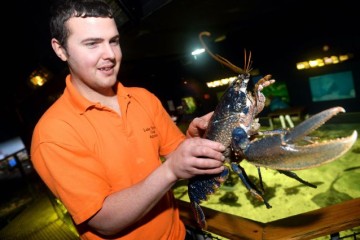 The town’s aquarium is raising lobsters to replenish the fisheries off the coast of Cumbria. When they’re big enough, the baby lobsters are released from a boat into the wild using weighted containers that sink slowly to the sea bed. The lids of the containers are made from paper so the baby lobsters can chew their way through it to freedom. Mark Vollers, the owner of Lake District Coast Aquarium, said: “There is clearly a strong connection to the mother in the breeding cycle in that if the eggs are taken from her they don’t survive or hatch successfully. “She has to release them when she senses the time is right. Read the rest here 10:11
The town’s aquarium is raising lobsters to replenish the fisheries off the coast of Cumbria. When they’re big enough, the baby lobsters are released from a boat into the wild using weighted containers that sink slowly to the sea bed. The lids of the containers are made from paper so the baby lobsters can chew their way through it to freedom. Mark Vollers, the owner of Lake District Coast Aquarium, said: “There is clearly a strong connection to the mother in the breeding cycle in that if the eggs are taken from her they don’t survive or hatch successfully. “She has to release them when she senses the time is right. Read the rest here 10:11
New Hampshire lobstermen see no shortage of lobsters
 If lobsters are running scared from warmer southern New England waters, local lobstermen aren’t experiencing a similar shortage. According to Red Perkins, manager at Seabrook’s Yankee Fisherman’s Cooperative, lobsters are in good supply this year, although not as abundant as a few years ago.”We’re not noticing a shortage here,” Perkins said yesterday. “Last year we had a realistic lobster harvest and this year is the same as last year. A couple of years ago it was a very good year. It’s not strange for quantities to vary over the years.” Read the rest here 11:51
If lobsters are running scared from warmer southern New England waters, local lobstermen aren’t experiencing a similar shortage. According to Red Perkins, manager at Seabrook’s Yankee Fisherman’s Cooperative, lobsters are in good supply this year, although not as abundant as a few years ago.”We’re not noticing a shortage here,” Perkins said yesterday. “Last year we had a realistic lobster harvest and this year is the same as last year. A couple of years ago it was a very good year. It’s not strange for quantities to vary over the years.” Read the rest here 11:51
Colourful lobsters being hauled in across the Maritimes
 Lobster season may have been slow to get started but several colourful lobsters are being caught in traps across the Maritimes. Gaston Martin was the latest to haul in a bright blue lobster. “Caught this little bleu guy in one of my traps the other day of Escuminac Point, N.B.,” Martin said in a message. Donald Aubé discovered a yellow lobster in one of his traps off the coast of Petit-Rocher this week. Photo’s, Read the rest here 12:02
Lobster season may have been slow to get started but several colourful lobsters are being caught in traps across the Maritimes. Gaston Martin was the latest to haul in a bright blue lobster. “Caught this little bleu guy in one of my traps the other day of Escuminac Point, N.B.,” Martin said in a message. Donald Aubé discovered a yellow lobster in one of his traps off the coast of Petit-Rocher this week. Photo’s, Read the rest here 12:02






